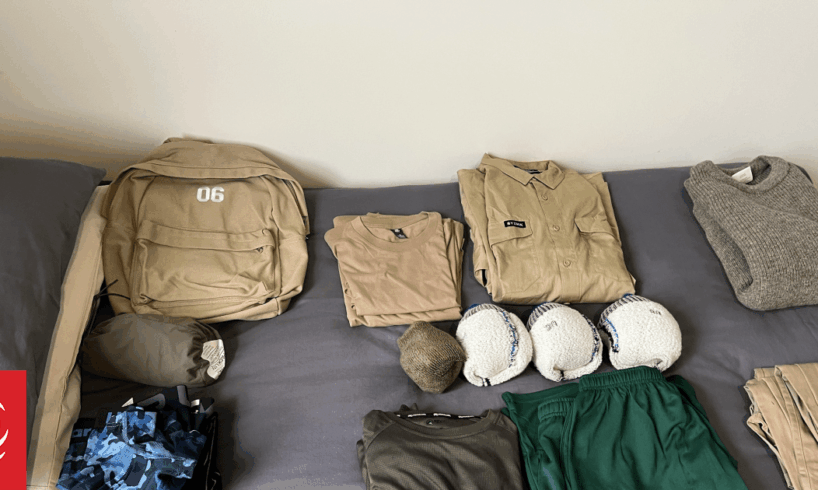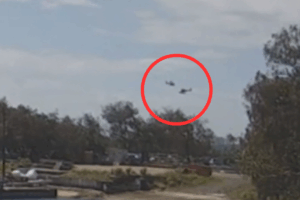
An example of the military style uniform the youth in the pilot will be required to wear.
Photo: RNZ / Rachel Helyer-Donaldson
Oranga Tamariki says it learnt a lot from the coalition’s boot camp trial, but documents seen by RNZ show many of those lessons were identifed more than a decade ago and shared with the programme designers.
Emails show a ministry evaluation of “military-style activity camps” run in 2009 and 2010 was sent to Oranga Tamariki staff in March 2024 as they were preparing National’s promised boot camp pilot.
“Probably not telling you anything you don’t already know but it’s a good summary of previous work done in this space and highlights the lessons that we can learn from the earlier work,” the email read.
The document summarising the main findings presented it as a “focus on findings that could inform the design and establishment Military Style Academies and help mitigate or avoid potential pitfalls”.
Among the lessons to learn were: rushed implementation, a lack of clarity around roles, inadequate information, training and resource, better engagement with whānau and a need to involve iwi services.
Many of the same themes are present in the final independent evaluation of the government’s latest military-style academy pilot, released in early November.
For example, while it noted “meaningful and positive change” for the young people, it named various challenges: rushed implementation, challenging transitions, a lack of continuity around therapeutic support, a lack of capacity in the residential phase, the need to engage with mana whenua earlier and support for whānau began too late before the rangatahi returned home.
The opposition parties say it’s proof the government is simply recycling old failures, but Oranga Tamariki insists it did take on board lessons from the earlier programmes.
Opposition hits out
Labour’s children spokesperson, Willow-Jean Prime, said the emails proved the government had “sunk millions into an experiment that has repeated the same failures of the past”.
She said the pilot was a “disgrace and utter waste of time” which the government had rushed through for “political headlines”.
“We need real, proven wrap-around interventions that work, not failed experiments that take us back down a road of harm.”
The Green Party’s youth and corrections spokesperson, Tamatha Paul, said the pilot had been an “enormous waste of time and resource”.
“Doing the same thing repeatedly and expecting different results is insanity,” she said.
“The international and domestic evidence shows clearly that this approach does not lead to reduced re-offending. The far more effective and cheaper intervention is resourcing community-based kaupapa to support rangatahi in their neighbourhoods.”
Te Pāti Māori co-leader Debbie Ngarewa-Packer said the government had obviously failed to learn any lessons from its “experments”.
“This information confirms what we already knew to be true: boot camps and punishment have never been the solution for our tamariki,” she said.
The government’s response
David Seymour and Karen Chhour look at the type of footwear youth at the new military academy pilot would receive in July 2024.
Photo: RNZ / Rachel Helyer-Donaldson
In a statement, Minister for Children Karen Chhour told RNZ she strongly believed the pilot had been a success. She said the review reflected that, while also acknowledging opportunities for improvement.
“The reality for our young serious offenders is that they are on a pathway to adult Corrections and a lifetime in-and-out of incarceration unless they are given a chance to turn their lives around and take that chance. This programme has been that chance.”
Chhour said social workers and mentor teams had put a “huge amount of work” into supporting the nine young people and their 29 sibilings, including helping them access housing, education and health assessments.
She said the pilot was reviewed while it was underway and its successes had helped the government achieve its target of reducing serious and persistent youth offending “a half decade early”.
Military-Style Academy programmes lead Janet Mays provided RNZ with a statement, insisting that the agency did consider the previous evaluation when designing the new pilot and took “several lessons” into account.
Mays said officials also took on board “the findings of a thorough literature review on a range of intervention programmes for young offenders”.
Asked why many of the same difficulties were identified in the latest programme, Mays acknowledged a short timeframe had “impacted some outcomes”.
She said the community transition phase could be strengthened and Oranga Tamariki had acknowledged mana whenua should have been involved in the design of the pilot earlier.
But Mays said the pilot was well-resourced, and kaimahi had “good role clarity in residence” and received “two weeks of intensive training” before the programme’s launch.
She said the therapeutic intervention offered in the residency phase was “extensive” and showed improvements.
“The MSA Pilot was a new initiative that aimed to help a small group of serious and persistent young offenders turn their lives around by providing them with increased structure, support and opportunities.
“We have learnt a lot from this pilot, which will strengthen and shape how we best support rangatahi in the future.”
Sign up for Ngā Pitopito Kōrero, a daily newsletter curated by our editors and delivered straight to your inbox every weekday.





